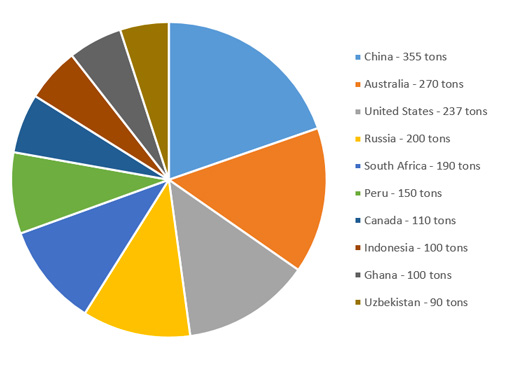Gold can be found spread across much of the planet and has been mined on each of the seven continents - even Antarctica! (Although not in a commercial capacity).
This wide distribution of gold is thought by scientists and geologists to be due to millennia of bombardment by huge alloy rich meteorites that peppered the earth’s surface with deposits of gold over two billion years ago.
Gold is acquired from the ground in many different ways, varying greatly between countries and changing with the geography and geology of each location. From deep mining of hard rock deposits such as those found in South Africa, where mines reach almost 4 kilometres below the earth’s surface to panning of open streams in the Alaskan wilderness, gold mining is a dangerous and ever increasingly expensive business!
Just how much gold is there on planet earth? Depending on who you ask, Scientists and Geologists estimate anywhere up to 2.5 million tonnes! But more important is the amount of accessible gold, that is, the metal that can be mined within the scope of current technological, environment and economic boundaries…
As ‘in ground’ gold becomes scarcer, miners have to dig deeper, travel further and develop cutting edge technology to keep up with demand. Longer term, these ever increasingly exhaustive activities must surely force the price of gold up as a result of simple supply and demand economics.
According to estimates from major market analysts, around 3,500-3,600 tons of gold was mined globally in 2022.

* Data from United States Geological Services Mineral Commodities Study.
Top 10 Biggest Gold Discoveries
- Witwatersrand Basin (South Africa) - The Witwatersrand Basin holds the largest gold deposit ever found, with estimated gold reserves of 50,000 tons. This expansive basin helped make South Africa the world's largest gold producer for over 100 years.
- Homestake Mine (USA) - Discovered in 1876 in South Dakota, the Homestake Mine produced over 40 million ounces of gold throughout its lifetime and kickstarted the Black Hills Gold Rush.
- Grasberg Mine (Indonesia) - Located in Papua, the Grasberg mine currently holds the world's largest gold reserves of over 70 million ounces. Mining began in 1988.
- Muruntau Gold Deposit (Uzbekistan) - This open-pit mine in the Kyzyl Kum Desert has produced over 80 million ounces of gold since mining began in 1967. It's believed to have over 100 million ounces still untouched.
- Carlin–type gold deposits (USA) - The Carlin Trend in Nevada hosts numerous deposits that together hold anywhere from 140-160 million ounces of gold reserves. Mining began in the 1960s.
- Mponeng Gold Mine (South Africa) - Mponeng is one of the world's deepest mines, extending 2.5 miles underground. It holds nearly 35 million ounces of gold reserves.
- Olympic Dam Mine (Australia) - This large mine in South Australia produces gold along with uranium and copper. It has total reserves estimated at over 30 million ounces of gold.
- Yanacocha Mine (Peru) - Located high in the Andean Mountains, Yanacocha is Latin America's largest gold mine with over 50 million ounces extracted since 1993.
- Goldstrike Mine (USA) - The Goldstrike complex located on the Carlin Trend in Nevada has produced over 40 million ounces of gold since its discovery in 1962.
- Obuasi Mine (Ghana) - One of Africa's oldest and richest mines, Obuasi has yielded over 30 million ounces of gold since mining began there in 1897.
Is Gold Found in the UK?
The United Kingdom has a rich history of gold mining and gold discoveries, but the presence of commercially viable gold deposits is relatively limited. While gold can be found in various regions across the UK, it's essential to understand that the quantities are generally small and not on a scale comparable to major gold-producing countries. Here is an overview of gold occurrences in the UK:
1. Historical Gold Mining:
Gold has been mined in the UK for centuries, with evidence of ancient Roman and Celtic gold mining activities. During the Victorian era, there was a resurgence of gold mining in areas such as Wales, Scotland, and Northern Ireland. However, most of these historical mines are no longer in operation, and the production was relatively modest.
2. Current Gold Production:
As of the current date, there is no large-scale gold production in the UK. Some small-scale gold mining operations and hobbyist prospectors continue to search for gold in rivers and streams, particularly in Scotland and Wales. However, the overall production remains limited.
3. Gold Occurrences:
Gold is primarily found in association with other minerals, such as copper, lead, and zinc. Some regions known for gold occurrences include the Dolgellau Gold Belt in Wales, the Southern Uplands of Scotland, and certain areas of Northern Ireland. These locations have historically yielded small amounts of gold.
4. Environmental and Regulatory Considerations:
Due to environmental concerns and stringent regulations, modern gold mining in the UK is challenging. The focus has shifted towards environmentally responsible practices and sustainability.
5. Gold Prospecting and Hobbyist Activities:
While commercial gold mining is not prevalent in the UK, gold prospecting and panning continue to attract hobbyists and enthusiasts. People enjoy exploring the country's rivers and streams in search of gold as a recreational activity.
While gold can indeed be found in the UK, the scale of production and economically viable deposits are limited. The UK is not considered a major gold-producing country on a global scale. Nevertheless, gold mining history, hobbyist activities, and potential exploration opportunities contribute to the intriguing allure of gold in this region.
What happens next?
The World Gold Council report that in 2012, jewellery manufacturing was the largest ‘consumer’ of gold, utilising just over 400 tonnes of the metal, followed by investment bullion bars and coins at 285 tonnes and almost four times as much as technology usage at just over 100 tonnes.
Want to learn more about gold mining and usage? The World Gold Council have a wide range of articles covering every aspect of gold.
















